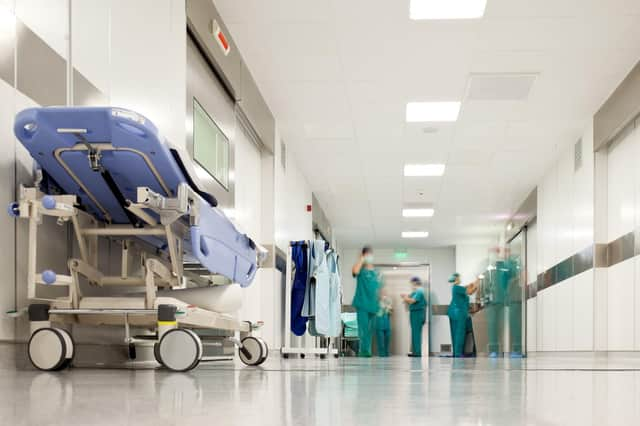Dani Garavelli: Eyewitness to the stark reality of Scottish NHS in crisis


At the nurses’ station, she spots a nurse bent over, her head in her hands. “She looked so exhausted I didn’t want to bother her,” she will tell me later in our nightly debrief, “but I had no choice. And, bless her, she came straight away, and calmed him down.”
This patient – a member of my family – has been in hospital for 14 weeks. Everyone - doctors, nurses, his wife, his son – agree he would be better off elsewhere. There is no stimulation here, no opportunity for physiotherapy, and only sporadic psychiatric input. Though the food is good, he has lost a stone and a half. He is on a waiting list for another unit which specialises in the care and rehabilitation of the elderly, but none of its beds has become available.
Advertisement
Hide AdAdvertisement
Hide AdThe crisis in health and social care has been reported on for many years now; I have written about it myself. Because of this, I am aware my relative’s situation is not unusual; that his experience is replicated across the UK. Yet “knowing” about the problem - understanding it is rooted in a mix of demographics and austerity - does not make experiencing it first-hand any less shocking.
Walking through the front doors of this particular hospital, the weariness is palpable, as if it has seeped into the fabric of the building. The six-bed ward my relative is in is constantly full: the instant one patient is wheeled out, another is wheeled in. The majority are confused and/or suffering delusions. They fret about money, imagine the staff are conspiring against them, knock over water jugs, pull out their catheters, and sometimes engage in verbal or physical abuse. As the nurses take one patient to the toilet, others will be yelling for help. On top of their actual medical job, staff have to serve as counsellors, mediators and warders.
This takes its toll on the quality of care. While, individually, those who work there appear committed, the atmosphere is often one of barely-contained panic, and the communication from shift to shift can be lackadaisical. Personal items, such as dentures, go missing as patients are transferred from one ward to another and some have suffered falls. Mistakes have also been made in my relative’s treatment, with apologies proffered.
A more knowledgeable friend recently introduced me to the concept of “moral distress”: the psychological unease generated when a lack of resources or other factors make it impossible for medical professionals to pursue the course of action they know to be most ethical and effective. Moral distress is said to produce “feelings of powerlessness, self-blame, anger, frustration, discouragement, anxiety and depression, deterioration of morale and teamwork and challenges related to patient safety.”
I do not know whether those nurses involved in my relative’s care are experiencing “moral distress”. But I can see how those who entered the profession determined to make sick people well must be demoralised by the daily battle to keep their punctured ship afloat. They must be petrified, too, that something terrible will happen on their watch, like the death of 16-year-Aoife Johnston who succumbed to meningitis after a 16 hours spent on a hospital trolley at University Hospital Limerick.
Such distress spills over into social media. “Today was the worst shift I have ever had with the ambulance service,” paramedic Kristin Houlgate tweeted on December 19. “We watch these patients deteriorating, sometimes dying in front of us, desperately trying to help them, but powerless as the system is so utterly broken that there is simply no space, no bed, no doctor that isn't already treating someone equally as sick.”
Her testimony is devastating. But care is being undermined in more insidious ways, too. “I’m still thinking about the elderly lady in the corridor I avoided making eye contact with on Tuesday,” emergency medicine doctor Linda Dykes wrote a few days later. “I walked past because I was hungry, tired and trying to get home two hours late. She was on a chair looking lost. I wish I'd had the energy to stop and offer her a cup of tea.”
The morale of medical professionals is unlikely to be buoyed by the prospect of imminent change. Instead, each day brings increasingly dire warnings. As I was writing this column, chair of BMA Scotland, Iain Kennedy, claimed the "whole health and social care system in Scotland [was] broken” and the NHS was haemorrhaging medical staff who were "exhausted, burnt-out and broken".
Advertisement
Hide AdAdvertisement
Hide AdKennedy spoke as nurses, midwives and junior doctors in Scotland were preparing for possible industrial action. Health chiefs in England have already warned they cannot guarantee patient safety during strikes. But then, as others have pointed out, with demand outstripping capacity, patient safety cannot be guaranteed outside of strikes either.
The NHS’ most important resource is its frontline workers. Quality care depends on them feeling supported and valued enough to carry on working within the service. Most people understand this. That’s why a recent poll showed two thirds of Scots would support nurses should they strike, while 54 per cent would support junior doctors.
For families like mine, with loved ones in hospital, the thought of a further reduction in staff ratios is scary. Our immediate consideration is for our relatives’ well-being. At the same time, we can see the status quo is working for no-one. Not for the worn-out nurse with her head in her hands; nor for the patients she was trying so hard to look after.
Comments
Want to join the conversation? Please or to comment on this article.